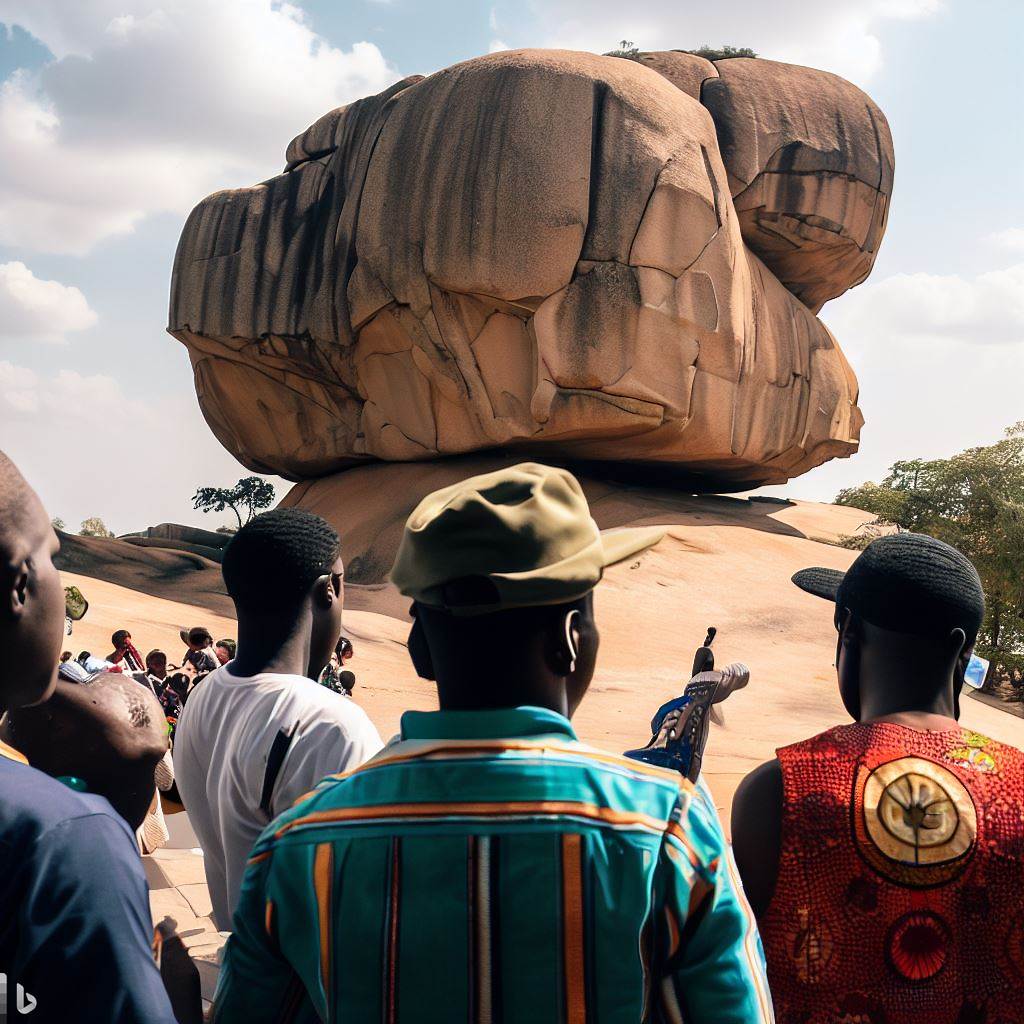Introduction
Nigeria is more than just oil and politics; it is a hidden gem in terms of tourism.
With its vast landmass and diverse ethnic groups, the country offers a wide range of attractions for adventure-seeking travelers.
Let’s dive into the must-visit destinations from a guide’s point of view.
First on our list is the Yankari National Park, a wildlife enthusiast’s paradise. Situated in Bauchi state, this park boasts a large population of elephants, antelopes, and different bird species.
The park also features natural springs and a warm water reserve, making it an ideal spot for relaxation and rejuvenation.
Next, we have the Olumo Rock in Abeokuta, Ogun state. This iconic landmark offers breathtaking views of the city and a chance to explore historical caves.
Visitors can climb to the top of the rock through carved stairs and immerse themselves in the stories and legends surrounding this ancient monument.
For those craving beachside relaxation, the breathtaking beaches of Lagos should not be missed.
With pristine white sand and turquoise waters, places like Tarkwa Bay and Elegushi Beach provide the perfect escape from the bustling city life.
Visitors can indulge in water activities, sunbathe, or simply enjoy the serene atmosphere.
Moving further north, the city of Jos in Plateau state offers a unique blend of beauty and adventure.
From the famous “Matsirga Waterfalls” to the captivating Riyom Rock Formation, nature lovers will be captivated by the scenic landscapes and the opportunity to trek and hike through these picturesque locations.
In general, Nigeria is a country rich in natural wonders, historical sites, and cultural diversity.
From wildlife safaris in Yankari National Park to the stunning beaches of Lagos, there is something for every traveler.
So pack your bags, hire a guide, and embark on an unforgettable journey through the top tourist destinations in Nigeria.
Lagos – The City that Never Sleeps
A. Description of Lagos and its attractions
Lagos, the largest city in Nigeria, is a bustling metropolis that never fails to captivate visitors with its vibrant energy.
With its stunning coastline, modern skyscrapers, and rich cultural heritage, Lagos offers a unique blend of history, tradition, and modernity.
One of the most notable attractions in Lagos is Victoria Island, a vibrant and upscale neighborhood known for its luxurious hotels, restaurants, and bars.
Visitors can enjoy stunning views of the Atlantic Ocean, take a stroll along the popular Tarkwa Bay Beach, or explore the bustling markets and art galleries.
B. Must-visit spots in Lagos, such as Victoria Island and Lekki Conservation Centre
Another must-visit spot in Lagos is the Lekki Conservation Centre, a paradise for nature lovers. This sprawling reserve is home to a rich diversity of wildlife, including monkeys, crocodiles, and rare bird species.
Visitors can participate in canopy walks, nature trails, and forest tours to immerse themselves in the beauty of Lagos’ natural surroundings.
C. Insight into the vibrant nightlife and cultural experiences in the city
Lagos is renowned for its vibrant nightlife, offering a wide array of entertainment options to suit every taste.
Visitors can dance the night away at trendy clubs and lounges, enjoy live music performances by local artists, or indulge in delicious street food at night markets.
Additionally, Lagos boasts a rich cultural scene that showcases Nigeria’s diverse heritage.
The city is home to numerous museums, such as the Nigerian National Museum and the Nike Art Gallery, where visitors can explore the country’s history and admire beautiful works of art.
Traditional festivals, such as the Eyo Festival and the Lagos Carnival, also provide a unique opportunity to witness traditional dances, music, and costumes.
Basically, Lagos is a city that never sleeps, offering a plethora of attractions and experiences that will leave visitors in awe.
Whether you’re seeking stunning natural landscapes, vibrant nightlife, or a deep dive into Nigeria’s rich cultural heritage, Lagos has it all.
Abuja – Nigeria’s Capital and Cultural Hub
A. Overview of Abuja and its significance as the capital city
Abuja, the capital city of Nigeria, is a vibrant and dynamic metropolis located in the heart of the country.
With a population of over 2 million people, Abuja serves as the administrative, political, and cultural hub of Nigeria.
B. Exploration of the Nigerian National Mosque and Nigerian National Christian Centre
Visitors to Abuja cannot miss exploring the architectural wonders of the Nigerian National Mosque and the Nigerian National Christian Centre.
The Nigerian National Mosque, also known as the Abuja National Mosque, is a stunning piece of Islamic architecture.
With its intricate designs, towering minarets, and serene atmosphere, it attracts both Muslim worshippers and tourists seeking a glimpse into Nigeria’s religious heritage.
On the other hand, the Nigerian National Christian Centre stands as a symbol of Christianity in Abuja.
Its grandeur and majestic structure showcase the rich cultural and religious diversity of Nigeria.
Visitors can attend religious services or simply admire the breathtaking beauty of the center.
C. Highlights of arts and culture in Abuja, including the prestigious Abuja Arts and Crafts Village
Abuja is not just a political powerhouse; it is also a city that thrives on arts and culture.
The Abuja Arts and Crafts Village is a must-visit location for art enthusiasts and tourists alike.
This village is a vibrant marketplace where local artisans display their exquisite crafts, including pottery, woodwork, weaving, and traditional Nigerian fabrics.
Visitors can witness the skill and creativity of these craftsmen while also having the opportunity to purchase unique souvenirs.
Aside from the Arts and Crafts Village, Abuja is also home to several galleries and museums that showcase the rich history and heritage of Nigeria.
The National Council for Arts and Culture is a major cultural institution that hosts various exhibitions and cultural festivals throughout the year.
Moreover, the city is renowned for its lively music scene, with numerous live music venues showcasing both traditional Nigerian music and contemporary genres.
Abuja also hosts annual music festivals that attract renowned local and international artists.
In fact, Abuja’s status as Nigeria’s capital city is not only limited to politics and administration.
It is a city that breathes culture, art, and religious diversity. From its stunning mosques and Christian centers to its vibrant arts and crafts scene, Abuja offers a true taste of Nigeria’s heritage and traditions.
Whether you are a history buff, art lover, or religious pilgrim, Abuja has something to offer for everyone.
Read: Customer Service Ethics in Nigeria: Best Practices & Laws

Calabar – The Carnival City
A. Introduction to Calabar and its historical significance
Calabar, the capital city of Cross River State in Nigeria, is a place rich in history and cultural heritage.
It was an important trading hub during the colonial era and served as a major port for the export of goods such as palm oil and kernels.
Today, it is renowned for its vibrant culture, warm hospitality, and the famous Calabar Carnival.
B. Description of the annual Calabar Carnival, Africa’s biggest street party
The Calabar Carnival is an annual event that takes place during the Christmas season. It is often referred to as Africa’s biggest street party and attracts thousands of tourists from all over the world.
The carnival showcases the diversity and creativity of the Nigerian people through various performances, music, dance, and colorful costumes.
The main highlight of the carnival is the street parade, where different cultural groups and organizations showcase their talents and present breathtaking floats.
It is a visual spectacle like no other, with participants dressed in elaborate costumes representing various themes and cultures.
The contagious energy, vibrant music, and enthusiastic dancers make the carnival a truly unforgettable experience.
C. Showcase of natural attractions like the Drill Rehabilitation Centre and Kwa Falls
Aside from the Calabar Carnival, Calabar also offers a range of natural attractions that are worth exploring.
One of these is the Drill Rehabilitation Centre, which is dedicated to the conservation and rehabilitation of the endangered drill monkey species.
Visitors can learn about these fascinating creatures and even have the chance to interact with them in a controlled environment.
Another must-visit destination in Calabar is the Kwa Falls, a stunning natural wonder located just outside the city.
Surrounded by lush greenery and towering cliffs, the waterfall cascades into a crystal-clear pool below.
Visitors can take a refreshing swim or simply admire the breathtaking scenery.
Calabar is also home to the Tinapa Resort, a world-class entertainment and leisure destination.
It features a variety of facilities such as shopping outlets, restaurants, a water park, and a movie theater.
Visitors can indulge in retail therapy, enjoy delicious local cuisine, or simply relax and unwind with their loved ones.
In short, Calabar is truly a destination that has it all – from its rich history and cultural heritage to the exhilarating experience of the Calabar Carnival.
Visitors can immerse themselves in the city’s vibrant atmosphere, witness the diverse cultural expressions, and explore the natural wonders that surround it.
Whether you are a history enthusiast, a party-goer, or a nature lover, Calabar is sure to leave you with unforgettable memories.
Read: Becoming a Tour Guide in Nigeria: A Step-by-Step Guide
Uncover the Details: The Growing Demand for Wind-Turbine Technicians in Nigeria
Olumo Rock – A natural wonder
A. Background information on Olumo Rock and its geological features
Olumo Rock, located in the city of Abeokuta in southwestern Nigeria, is a fascinating natural wonder.
It is a massive granite outcrop that stands at approximately 137 meters tall and has a rich geological history dating back millions of years.
The rock formation is believed to have been created through the process of volcanic activity, followed by years of erosion that sculpted it into its present form.
The resulting rock features various layers and crevices, creating a unique and captivating sight.
Olumo Rock is not only a geological marvel but also holds significant cultural and historical importance to the people of Abeokuta and Nigeria as a whole.
B. Importance of the rock as a historic and cultural landmark
Olumo Rock has been a symbol of courage and resistance for the Egba people, who used it as a refuge during wars in the 19th century. It served as a fortress and provided them protection during conflicts.
Furthermore, the rock holds significant spiritual and cultural importance. It is believed to have been a sacred place where traditional rituals were performed, making it a spiritual center for the locals.
Today, Olumo Rock stands as a historic landmark and a symbol of pride for the people of Abeokuta.
It attracts both local and international tourists who are eager to explore its historical and cultural significance.
C. Guide on climbing the rock and experiencing the breathtaking view from the top
Climbing Olumo Rock is an adventure that offers visitors a chance to witness breathtaking panoramic views of Abeokuta city and its surroundings. Here’s a guide to making the most of this experience:
Wear comfortable shoes and clothing suitable for hiking, as the climb can be steep in some areas.
Start by taking the stairs that have been carved into the rock, leading you through its various levels and points of interest.
Along the way, you’ll encounter interesting attractions like the ancient Itoku market and the Olusegun Obasanjo Presidential Library.
Make sure to explore the historical relics and artifacts on display within the rock, offering insights into its cultural significance.
As you reach the top, take a moment to appreciate the stunning view of Abeokuta city, with its mix of modern structures and traditional architecture.
On a clear day, you might even catch a glimpse of the Ogun River meandering through the landscape.
Don’t forget your camera to capture the beauty of the surroundings and create lasting memories.
Publish Your Professional Profile, Business or Brand
Showcase your expertise, gain trust, and boost visibility instantly on Professions.ng.
Publish NowAfter descending the rock, you can visit the nearby museum to delve deeper into the history and traditions associated with Olumo Rock.
All in all, Olumo Rock is not only a natural wonder but also a symbol of cultural and historical significance.
Climbing this rock offers an unforgettable experience to explore its geological features and enjoy mesmerizing views from the top, making it a must-visit destination in Nigeria.
Read: Nigeria’s Tour Guide Licensing: What You Need to Know
Explore Further: How COVID-19 Impacted Medical Secretaries in Nigeria
Delve into the Subject: Hotel Receptionist Jobs: Where to Look in Nigeria
Ogbunike Caves – Exploring Nigeria’s Ancient Caves
A. Overview of Ogbunike Caves and their spiritual significance
The Ogbunike Caves, located in Anambra State, Nigeria, are a system of natural caves that hold great religious and cultural importance.
The caves are considered sacred and are used for spiritual worship and cultural ceremonies by the local Igbo community.
B. Description of the impressive rock formations and the river that flows through the cave
The Ogbunike Caves boast breathtaking rock formations, some dating back millions of years.
These formations showcase the power and beauty of nature, with stalagmites and stalactites elegantly adorning the cave walls.
The caves are also home to an underground river, which adds to the enchanting atmosphere.
C. Tips for visitors, including necessary equipment and guided tours
When exploring tourist destinations in Nigeria, the Ogbunike Caves are a must-visit.
Located in Anambra State, these natural wonders are steeped in cultural and religious significance for the Igbo community.
The Ogbunike Caves have served as a site for spiritual worship and cultural ceremonies for generations.
Local people have sought blessings from deities and connected with their ancestors within these sacred caverns.
Visitors can sense the powerful energy resonating within, making it a unique destination for cultural and religious exploration.
Inside the caves, awe-inspiring rock formations shaped over millions of years grace the surroundings, showcasing nature’s grandeur. Stalagmites and stalactites adorn the cave walls, leaving you mesmerized.
As you delve deeper, an underground river flows through intricate tunnels, its rushing waters adding to the mystical ambiance.
To fully enjoy your visit, wear comfortable clothing and sturdy footwear for the uneven terrain. A flashlight is recommended for navigating dark areas.
For a richer experience, hire a local guide who can provide insights into the cave’s history, culture, and spirituality.
The Ogbunike Caves are not just a natural wonder but also a cultural treasure, promising an unforgettable journey for those seeking adventure, spirituality, and cultural exploration in Nigeria.
Read: Accessibility in Customer Service in Nigeria: A Priority
Conclusion
Tourist Destinations in Nigeria hold immense significance, not only for their cultural richness but also for their pivotal role in bolstering the country’s economy.
This guide aims to shed light on some of the finest attractions that this diverse nation has to offer.
Tourism contributes significantly to Nigeria’s economic growth, providing employment opportunities and foreign exchange earnings. It is crucial to acknowledge the role of tourism in driving development.
In the end, I invite readers to embark on a personal journey to explore the enchanting tourist destinations in Nigeria.
Witness the breathtaking beauty and immerse yourself in the rich cultural heritage that this remarkable nation has to offer.




